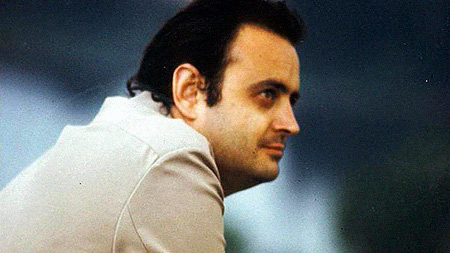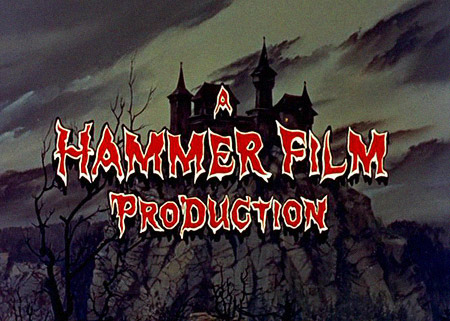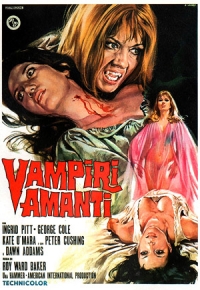Ever since Night of the Living Dead tore the doors open on what was acceptable in a horror film, every filmmaker inspired by it seemed to try and do something like it, or push it even further. It had a domino effect that is still being felt today with films like Hostel, The Loved Ones and Martyrs taking shock and disgust to a whole new level. But the problem with today’s horror films is that there isn’t much distinct or different about them. Nothing truly original comes along very often. Everything’s floating around in a sea of constant remakes, parodies, homages, knock-offs and reimaginings, the likes of which has never been as prevalent in the history of cinema until now. There’s also something else going on though. Originality itself is becoming a scarce thing. All of the good ideas have been executed already. It can especially frustrating, especially for a screenwriter trying to come up something to new, to learn that what you thought was a really great idea has already been done.
What it boils down to nowadays, at least from a marketing point of view, is recognition of a brand name or a product, like the recent Evil Dead remake, for instance. Even though the filmmakers of the original were heavily involved with the film in every stage of the process and it relied heavily on old-fashioned special effects techniques, it still manages to come off as product by the simple fact of its existence. The gore in the film was used as a way to disgust and frighten audiences, which seemed to be moderately successful, but ultimately didn’t make much of an impact and people walked out of the theater ready for the next thing. Don’t get me wrong though. I’ll take something like this over more Paranormal Activity sequels any day of the week. The point is that all that’s left to be memorable in a horror film is to be completely, balls-out gory and disgusting, not unlike Ruggero Deodato’s Cannibal Holocaust from 1980.
I come from a generation of horror fans that grew up on heaping amounts of gore. Not just from the late 70’s and throughout the 80’s, but from the early 90’s, as well. The difference is that gore in those films was almost always tongue-in-cheek, and rather tame. In those days the MPAA would slap you with an X rating if you were too violent or gory, especially if you mixed sex with violence. Hell, even the original Dawn of the Dead was released unrated to avoid an X rating. As a consequence, many horror films during the 80’s were cut to pieces in order to get an R rating and make the film more marketable. Fast forward to now and you see how much the times have changed. A film like the new Evil Dead, gratuitously violent and gory for the biggest portion of its running time AND without the tongue-in-cheek behind it, receives an R rating today. Personally, I see it as one of the biggest hypocrisies in the film industry. I’m sure it’s especially frustrating for somebody like John Buechler or Steve Miner, whose entries in the Friday the 13th franchise were notoriously gutted by the MPAA.
So while violence reigns supreme in today’s horror market, sexuality gas been left in the dust because most Americans, like it or not, are afraid of nudity and sexuality in the media instead of hardcore violence and gore. Places in the world like the European market, however, are almost completely backwards in this regard. In the United Kingdom, they won’t even allow scenes of nunchucks to be seen on-screen. In places like France and Italy, human sexuality is much more important and accepted. So it comes as no surprise that a film like Zombie Lake is, tonally, much more about intimacy, sexuality and people, rather than horror.
Zombie Lake BD review
But let’s not split hairs here. For me it’s all about context. You can mix and match different elements into a horror film and find a nice balance, depending on the tone that you’re going after or what your initial idea was in the first place. It’s not just all about the carnage every single time. Sometimes it’s about the characters too, and how you can relate to them. It could also be about subtleties or overall themes and the horror is just a framework to get an idea across. European filmmakers were all over the place with this stuff, especially in Italy. Filmmakers like Dario Argento were the minority, in that they pushed the violence in their movies moreso than the sexuality. The thing is though that they weren’t above doing conventional films either, like Oasis of the Zombies, which is more of a straight-forward zombie tale than usual for the region.
Oasis of the Zombies BD review
On the other end of the continent, specifically in the UK, the approach was much more lavish and production-savvy, by comparison. Hammer Productions, for example, were taking all of the classic tales like Dracula, Frankenstein and The Mummy, and putting a robust and colorful new spin on them. It gave actors like Peter Cushing and Christopher Lee careers in the industry, most of whom are now synonymous with Hammer Productions (especially Cushing). But, like their neighbors, Hammer was also into pushing the boundaries of sexuality in the films they were doing, especially with films like The Vampire Lovers.
The Vampire Lovers BD review
It’s a shame that this type of filmmaking doesn’t really occur much anymore. Most horror films today are merely remakes that are basically Xeroxing what’s come before. Take that trailer for the new Carrie remake for instance. The trailer attempts to sell to you a movie that’s a carbon copy of the original, almost by design. It seems to be, beat for beat, every scene from the original film remade and shoved into a trailer to get you excited about seeing it, but here’s something that most people don’t think about when that happens: you know what the film is about already before seeing it.
I’m sure not everyone that’s reading this has actually seen Carrie, or read the book that it was based on. But, we all know what the story is and what it’s about. The scenes involving Carrie’s first period in the shower and being ridiculed for it, Carrie’s obsessive religious mother constantly scolding and abusing her, and of course, the famous prom scene where Carrie has pig’s blood dumped onto her and everything goes to hell. All of that is in the remake, and more importantly, it’s in the trailer, so that when you see it, you recognize all of those things. They don’t bother to try and build up intrigue about the story or how scary the movie is going to be. Nope. They just show you the scenes that you recognize because you’ve either seen them before or you know about them already because the story, in many ways, is embedded into popular culture. You think you’re seeing a new movie, but you’re not. You’re seeing a new version of the same story with the same characters and the same outcome. It usually works on people too, most of the time. More’s the pity, too. People spend their hard-earned money (upwards of $50 to $100, depending on how many people tag along) to see something that they could stayed home and watched instead. And, in 99.9% of all cases, the original is superior, so why buy an inferior product? But, people are naive enough to fall for it, and I feel very sorry for them for wasting their time and money.
 But, if that’s all that’s available, what’s the alternative? If you can’t see anything original or different as a theatrical experience, then what do you go see on a Friday night? It’s a dilemma for some people who see through the marketing scheme. Fortunately places like the New Beverly in Los Angeles and the Alamo Drafthouse are constantly celebrating older movies, including horror, and showing them on the big screen. Unfortunately, these locations are not nationwide. Someday they very well could be, but for now, the options are limited. I would personally suggest just staying home and saving your money instead of seeing something you already know, but at the end of the day, it’s still a matter of preference and opinion.
But, if that’s all that’s available, what’s the alternative? If you can’t see anything original or different as a theatrical experience, then what do you go see on a Friday night? It’s a dilemma for some people who see through the marketing scheme. Fortunately places like the New Beverly in Los Angeles and the Alamo Drafthouse are constantly celebrating older movies, including horror, and showing them on the big screen. Unfortunately, these locations are not nationwide. Someday they very well could be, but for now, the options are limited. I would personally suggest just staying home and saving your money instead of seeing something you already know, but at the end of the day, it’s still a matter of preference and opinion.
The ultimate point of all of this though is that there’s currently no strong output of risky or original horror movies in the market. There aren’t really any studios putting out anything of real quality or making any risky movies anymore, just safe bets. Sure the occasional risk-taker will pop up now and again, but not often, and when it does, it usually goes unappreciated anyway, which makes studios even more hesitant to greenlight original ideas. I can’t say how much that the European filmmakers in their heyday cared about how many people actually saw their work. I’m sure many of them were concerned in some way, but now that the theatrical market is less about risk and more about money-making schemes, films like Zombie Lake, Oasis of the Zombies and The Vampire Lovers have become much more important in the grand scheme of things. They get great treatment by distribution companies like Kino Lorber, Redemption, Twilight Time and Scream Factory, despite being in a niche market. I’m happy when little-seen or unknown gems like these crop up and get good treatment on the dual formats, especially horror films. If only we could get the same kind of treatment for a Friday night crowd, then we’d really have something, wouldn’t we? It’s food for thought.
And that’s all from me for now.
- Tim Salmons


